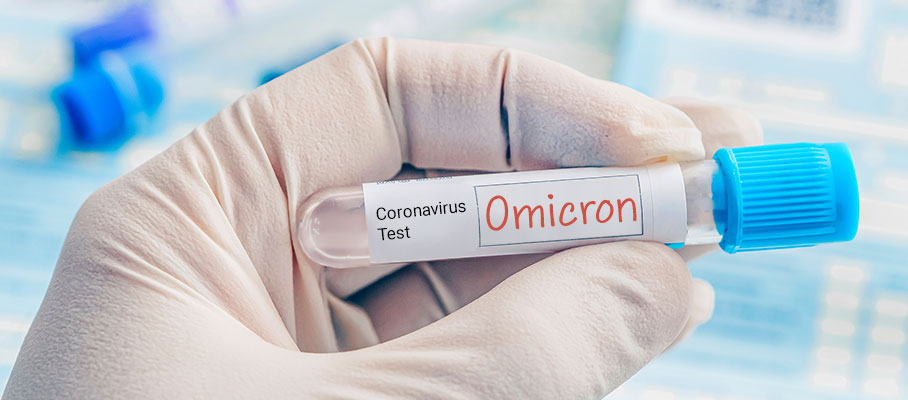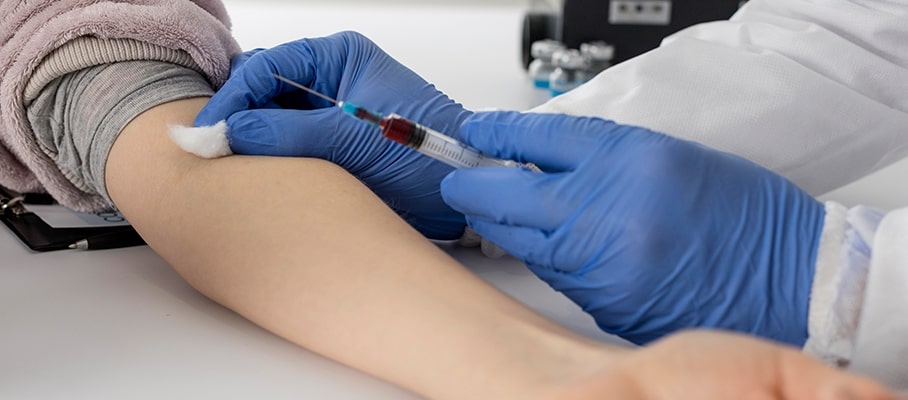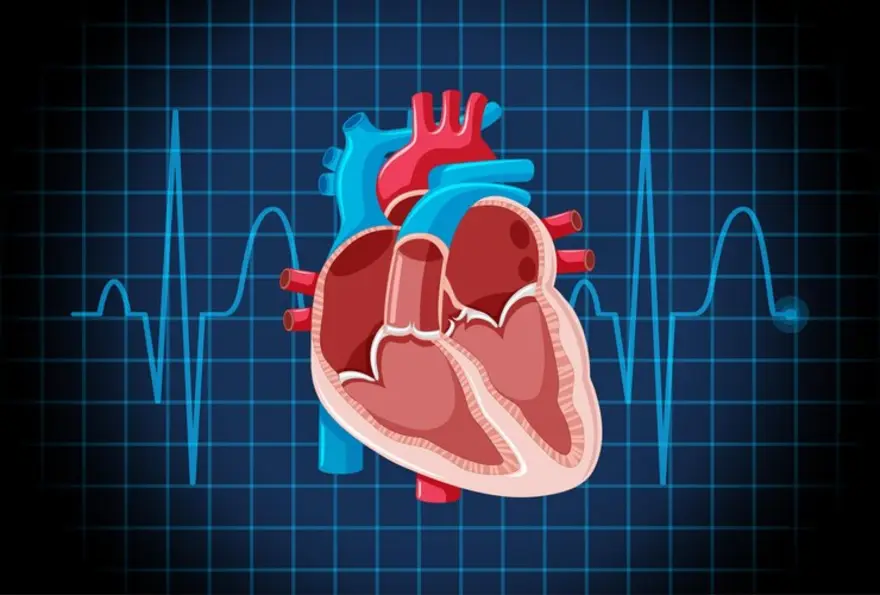Covid test at home
Omicron: What are the Symptoms, can it Evade Testing or Outsmart Vaccines? Get Your Answers here!
Life in India has returned to near normalcy in the wake of low case counts and a steady vaccine drive. The country has been recording fewer than 10,000 new cases daily and has vaccinated nearly 80% of the 940 million eligible adults with at least one dose so far.But yet another variant of the deadly coronavirus, found recently in parts of South Africa, has got the World into a frenzy again. With cities and states again posing stricter guidelines, halting the daily routine of the citizens, masks and sanitization are back in action. This new variant is termed as the Omicron, also tagged as B.1.1.529 and the World Health Organization has termed this as “variant of concern”. With the first case coming on 24th November, much research is still going on, with this virus, in order to understand it, and towards finding out its remedial measures, because the virus is said to have a large number of mutations, and thus the whole country is in fear of this new variant. With increasing cases in South Africa, the transmissibility is still yet to be confirmed, whether it is easily spread or whether the cases are due to the already prevalent virus categories. Studies are being conducted to get better data on the transmissible details from different sources. Here’s some important information you need to know about the new Covid variant called Omicron Omicron is the 13th variant and the latest of five 'variants of concern'. The five current variants of concern include: Alpha – B.1.1.7 – first detected in the UK Beta – B.1.351 – first detected in South Africa Gamma – P.1 – first detected in Brazil Delta – B.1.617.2 – first detected in India Omicron – B.1.1.529 – first detected in South Africa Is the new variant a cause of grave concern? The new variant is said to be heavily mutated; more than 30 mutations on the spike protein. According to researchers, this level of mutation has most likely come from immunocompromised individuals. The biggest concern that researchers have is that this virus is now radically different from the original one that emerged in Wuhan, China. We are yet to gather data on whether this variant could evade vaccine or natural immunity or have higher transmissibility. Having several mutations does not mean that the virus will be deadlier or more dangerous. Nevertheless, every variant would have the potential to impact the pandemic. Omicron symptoms: What to look out for? Though there are still studies and extensive research underway to find out if the symptoms associated with Omicron are any different from the earlier variants, and if so what are these new symptoms. Understanding these and the level of severity these have, might take some time, till then prevention is our only key solution. While the most common indicators remain fever, cough, excessive exhaustion and body aches, some also include breathlessness, chest pain, appetite loss, headaches, itchy throat etc. Some experts have suggested that Omicron may not cause much cold-like symptoms as in the Delta variant. Though cases have been mild and not reported any deaths, it still is not clear if Omicron will be as severe in comparison. Do not delay COVID testing if you get to notice any symptoms. The virus is still there and we need to be cautious. Book your RT-PCR here. Does the Omicron variant spread faster than the Delta variant? Can it cause a third wave too? It has been seen that the Omicron can spread faster than the previous Delta variants but enough data is not available to confirm this. The emergence of a new possibly more infectious variant has also raised the spectre of a third wave - a frightening prospect given how the second wave devastated India in the months of April and May as hospitals ran out of beds, oxygen and medicines. We need to be vigilant about the situation and watch out for our actions. Is the current RT-PCR test effective? As for the PCR tests that are being done, these continue to be able to detect this new infection just like the previous ones. In fact, unlike other variants, the RT-PCR test shall be able to give clues about Omicron infection even before genome sequencing. Do not ignore testing if you see any unusual symptoms and have an international travel history. Get tested with Metropolis. Are the existing vaccines effective? Initial evidence suggests Omicron has a higher re-infection risk and can infect fully vaccinated people too. Though all the current vaccines remain effective against the severe disease, WHO is still finding whether the already existing measures are enough to tackle this new virus in reducing its severity and preventing death. Scientists say it will take another three weeks to know how the heavily mutated variant impacts the effectiveness of various vaccinations. Meanwhile, do complete your vaccination doses to stay safe. Prevention and treatment As more and more information is emerging from various researches that are going on, individuals are again reminded of the same old measures like wearing masks in public or crowded places, regularly washing hands, maintaining a safe distance and practising social distancing wherever possible, having proper ventilation in the houses or any other indoor space and most importantly getting vaccinated.Countries and states have been on their toes again with the invent of this concerning virus, they fear the same situation might arise, where there might be a shortage of beds in the hospitals, oxygen plants have to be arranged in emergency and vaccine supply will be hit hard at the peak. In order to avoid that, the government has already started preparing themselves for what is yet to come. Enhancing surveillance, tracking cases and contacts, sharing data with the concerned authority to help them with their research for better medicinal treatments etc. are some of the recommended actions that responsible countries should take. As a precautionary move, the UN body has told the Asia Pacific Nations to brace for virus surge and focus on boosting vaccination numbers. Preliminary study from South Africa, the country where it merged, suggests that Omicron might have 3 times reinfection risks as compared to the Delta or Beta variants and also losing a layer of defence, the researchers said, a past Covid infection might give little immunity to the new Omicron variant. As we continue to fight this new variant, the first thing is to stay calm, getting yourself vaccinated, cooperating with the officials to get both doses of the vaccine, as the mutations may decrease efficacy but these jabs are sure to protect us against the severity of the virus. The WHO says Omicron could displace the Delta variant, and as studies keep evolving, prevention and precaution are better than cure at the moment. Stay safe and stay protected. References-https://www.who.int/news/item/26-11-2021-classification-of-omicron-(b.1.1.529)-sars-cov-2-variant-of-concern https://www.who.int/news/item/28-11-2021-update-on-omicron FAQs on Omicron. MoHFW h2 { font-size: 1.75rem; color: #212121; letter-spacing: 0.3px; font-weight: 500; } { "@context": "https://schema.org/", "@type": "BreadcrumbList", "itemListElement": [{ "@type": "ListItem", "position": 1, "name": "Homepage", "item": "https://www.metropolisindia.com/" },{ "@type": "ListItem", "position": 2, "name": "Prevention Healthcare", "item": "https://www.metropolisindia.com/blog/category/prevention-healthcare/" },{ "@type": "ListItem", "position": 3, "name": "Symptoms of Omicron Virus", "item": "https://www.metropolisindia.com/blog/prevention-healthcare/omicron-what-are-the-symptoms-can-it-evade-testing-or-outsmart-vaccines-get-answers-here/" }] }
COVID-19 Vaccination for Pregnant Women: All you need to Know
COVID-19 infection during pregnancy is a cause of great concern for the health of pregnant women and the unborn baby. While pregnancy does not increase the risk of catching COVID-19, studies have found that pregnant women are susceptible to have more severe illness with COVID-19 in contrast to non-pregnant women. These women are more likely to be admitted to the hospital, develop pregnancy complications or deliver prematurely. Therefore, experts believe that pregnant women should get vaccinated as the benefits of COVID-19 vaccination overshadow its side effects. Being vaccinated and continuing masking remain the only appropriate method to prevent this infection in pregnant women. This need of vaccination has become more urgent with the wake of the Delta variant of coronavirus. Few recent researches have highlighted the worse effects of illness on pregnant women infected with Delta variant of COVID-19. Getting symptoms suggestive of COVID-19? Do not delay testing any further. Book a home sample collection with us. Recently, the Government of India has approved vaccination of pregnant women against COVID-19 based on the recommendations from National Technical Advisory Group on Immunization (NTAGI). They have issued operational guidelines that ensure education to pregnant women to make an informed decision whether they should get vaccinated or not. This includes awareness about the risks of exposure to COVID-19 infection along with the risks and benefits associated with the COVID-19 vaccines available in the country. The eligible pregnant woman will be able to get any of the three vaccines currently authorised in India; Covishield (the local version of the AstraZeneca vaccine), Sputnik V (imported from Russia), or Covaxin (India’s homegrown vaccine). A pregnant woman, who chooses to take vaccination, could be vaccinated at any time of the pregnancy. Here we are answering some of the important questions around getting COVID-19 vaccine during pregnancy Should pregnant women take COVID-19 vaccine? Although pregnancy does not increase the risk to COVID-19 infection, pregnant women are at an increased risk for severe illness from COVID-19. Most pregnant women are reported to have asymptomatic or have mild disease, however, their health can deteriorate rapidly which will affect the health of the baby. Additionally, a pregnant woman significantly comes in contact with healthcare services throughout three trimesters and frequently visits high-risk places like laboratories and hospitals. These risk factors necessitate the need of protection against COVID-19 infection. According to WHO, there is insufficient evidence to believe that there will be specific risks that would outweigh the benefits of vaccination for pregnant women. Pregnant women who are at high risk may be vaccinated in consultation with their health care provider. What group of pregnant women are at increased risk of getting infected with COVID-19? Pregnant women at increased risk of getting infected with COVID-19 can be one who; Is a healthcare worker or a frontline worker. Living in a community with an increased rate of COVID-19 infections. Commonly come in contact with people outside the household. Difficulty in following social distancing protocols, like living in a crowded household. What group of pregnant women are at higher risk of developing complications after COVID 19 infection? Various risk factors responsible for developing complications after COVID 19 infection during pregnancy are: Pre-existing comorbidities such as diabetes, organ transplant recipients, chronic respiratory conditions like chronic obstructive pulmonary disease (COPD), asthma, cystic fibrosis, immunosuppression therapies, dialysis or advanced chronic kidney disease, congenital or acquired heart disease, etc. Advanced maternal age Obesity. When should women be vaccinated during pregnancy? Expectant mothers can be vaccinated at any time during their pregnancy. If a pregnant woman is opting to receive the COVID-19 vaccine during pregnancy or after the delivery of the baby, the CDC advises to schedule it at least 14 days before or 14 days after any other vaccination. It will be useful to consult an obstetrician about the best timing for routine vaccines and COVID-19 vaccine during pregnancy. When should a pregnant woman be vaccinated, if she was already infected with COVID-19? If a woman got infected with COVID-19 infection during the course of current pregnancy, then she should be vaccinated soon after the delivery. A healthy pregnancy has different needs across different three trimesters, health tests being one of the quintessential requirements. Explore Metropolis and book your pregnancy tests with a trusted partner. Book Pregnancy tests for the first trimester here. Click for Pregnancy tests for the second trimester. Tap to book Pregnancy tests for the third trimester. Is COVID-19 vaccination safe and effective in pregnant women? There is limited data available about the safety of COVID-19 vaccines for pregnant women. However, initial reports suggest that there are no safety concerns for either the pregnant women or their babies. More studies are needed to assess the risk of clotting in pregnant women, a side effect associated with AstraZeneca’s vaccine. What are the side effects of the COVID-19 vaccines for the pregnant woman or her baby? Like any other person, COVID-19 vaccine can cause a pregnant woman to get very mild side effects including mild fever, pain at injection site, or feeling unwell for 1-3 days. Guideline recommends that very rarely (one in 1-5 lakh persons) may experience adverse reactions within 20 days after COVID-19 vaccination. These below mentioned symptoms may need immediate medical attention. Shortness of breath Chest pain Pain in limbs / pain on pressing the limbs or swelling in the limbs Small pinpoint haemorrhages or bruising of the skin beyond the vaccination site Persistent abdominal pain with or without vomiting Seizures in the absence of previous history of seizures with or without vomiting Severe and persistent headaches with or without vomiting Weakness/paralysis of limbs or any particular side of the body Persistent vomiting without any obvious reason Blurred vision/ pain in eyes. What are the contraindications for vaccination in pregnancy? Pregnant women should not take vaccination in the following conditions: Anaphylactic or allergic reaction to the previous dose of COVID-19 vaccine Anaphylaxis or allergic reaction to vaccines or injectable therapies, pharmaceutical products, food-items etc. It is temporarily not advisable in the following conditions: Women should defer COVID-19 vaccination for 12 weeks from infection or 4 to 8 weeks from recovery COVID-19 infection Women who were treated with anti-COVID-19 monoclonal antibodies or convalescent plasma or have active COVID-19 infection. Can a pregnant woman get COVID-19 infection from the coronavirus vaccine? No, a pregnant woman cannot get COVID-19 infection from the currently available vaccines. She may experience mild, temporary side effects, which is indicative of the immune response to the vaccination, not COVID-19. What are the precautions needed for the pregnant woman after COVID-19 vaccination? Pregnant woman along with her family members should be counselled to follow COVID-19 appropriate behaviour including wearing mask, frequent handwashing, maintaining social distancing and avoiding crowded areas. Bottom line All pregnant women can register themselves on Co-WIN portal or may get themselves registered on-site at the COVID-19 vaccination centre. This process of registration for pregnant women is similar to the general population. Educating and counselling these women regarding the potential benefits of COVID-19 vaccination is highly crucial for them to make an informed decision about themselves and their baby’s health. We wish you a happy and safe motherhood!
Here is why you should never skip your health check
A lot has been talked about the importance of regular health check-ups. However, preventive health checks and health screening is often ignored. From the need of taking leave at the workplace to not feeling any need of a health assessment, even you might have skipped your regular health screening at some point of time! Why do you need a health check? Prevent health issues in the first place: Certain most common and serious chronic conditions including diabetes and high blood pressure might not cause any symptoms in the early stages. If you get your routine check-up done, not only will you come to know about your risk of getting diabetes or heart disease but also the current value of blood sugar and cholesterol. This helps you take preventive action to decrease your risk and stay clear of illnesses. Reverse your health conditions: If you are at the borderline, it might be possible to reverse your illness with expert advice and right care. For example, people having borderline diabetes or prediabetes can reverse their blood sugar values by getting tested on time and taking the required measures. You can have control over your health. Eliminates further progression or worsening of disease: Many of the chronic conditions are progressive in nature. If you don’t do anything about them well in time, it might lead to worsening of the symptoms or cause its progression. Getting a regular body check-up helps your doctors diagnose a disease before it poses high risk and take action Reduces the risk of complications in future: If you have been diagnosed with a health condition at an early stage, your treatment plan is devised on time. This helps lessen the complexity and risk involved. When it comes to disease diagnosis, the sooner the better. A regular check-up can also give clues in recovering your body from any health concerns. Book a complete blood count test and get a sneak peek into your blood picture. Saves your money: A regular health check-up can save your money in the long run. Moreover, preventive health check-ups can catch an early disease and reduce the risk of undergoing surgeries and developing complications which might need advanced medical interventions. Adds healthy and quality life years: A regular check-up of your body lets you see inside of your body and be assured of how healthy you are. You can be free from worries and anxieties. A stress free and healthy routine increases your lifespan as well. Who needs to get a regular check-up done? Everyone! Yes, from children to young healthy adults, from women to old-age adults, everyone needs to get their health screened regularly. That being said, people having chronic conditions require their health numbers to be tracked constantly. Follow your doctor recommendations about the frequency of getting health tests done. At large, regular check-ups with specific tests can vary depending on your age, gender, family history, and overall health status. Let us elaborate this a bit through some examples. Do you know people in the working-age group (30-60 years) are at a high risk of lifestyle diseases? Also, men are more likely to get diabetes. Postmenopausal women are at a higher risk of getting heart disease when compared to men of same age. In addition to these, unhealthy lifestyle changes, lack of physical activity and sleep can cause many health problems ranging from minor to severe health concerns. Getting a full-body check-up that includes tests for diabetes, cholesterol, heart disease can save your extra money in the long run. The COVID-19 Angle The current situation of dealing with a pandemic like COVID-19 has made it more important than ever to better care of your physical and mental health. Healthy people who don’t have any pre-existing health conditions and have strong immunity, can fight back the infection-causing virus. Ensure to get your elderly tested regularly too. Think you have symptoms of COVID-19? Don’t delay your test any more. Book home sample collection now. Do you avoid health tests? It could be Iatrophobia! Some people may have troubling symptoms but they put off doctor visits or medical tests that could help them. Such an irrational fear of doctors or health tests is called Iatrophobia. People simply refuse to get health tests done because of the horror they have to go through if something comes up. However, ignorance is never a bliss, when it comes to health. Do you fear visiting clinics or labs to get tested? With Metropolis being your pathology specialist, regular health checks will never be an issue. Or, worried of stepping out of home to get tested? We have got you covered. Backed by the advanced laboratory technologies, highly qualified technicians and home collection service, we’re standing by your side and committed to delivering trusted health reports, each and every time. Never hesitate to get a routine medical check-up. Get a preventive health check-up done, understand your health status, take informed decisions well in time, and secure your peace of mind. Explore our lab services and avail great offers on health tests, now from the comfort of your home.
Elderly Care - How to Provide Compassionate Support at Home
Aging is a normal physiological process. However, body organs also age with the advancing age, and their functioning keep declining. Old age is also a sensitive phase. Elderly people need care and comfort to lead a stress free and healthy life. Caring for the elderly at home is a responsibility that needs you to know about elderly care solutions and take informed decisions. Elderly care amid COVID-19 The WHO has informed us about old age and COVID-19. The risk of getting severe COVID-19 and getting hospitalized increases with increasing age. For example, people in their 50s are at higher risk for severe illness than people in their 40s. Similarly, people in their 60s or 70s are, in general, at higher risk for severe illness than people in their 50s. Elderly aging 85 or older are at the greatest risk for severe illness from COVID-19. Worried about your elderly loved one being sick and think it could be COVID-19? Get COVID-19 test done from the comfort of your home and stay assured. Health conditions and medications Many of the elderly people have multiple health conditions. For managing elderly health, ensure that all their medicine prescriptions are filled as needed and refilled in advance. If your elderly loved one is on a number of medicines and find it difficult to identify and take them on scheduled time, simplify their medication taking process by keeping a pill box organizer with compartments labeled with the days of the week along with doses. Continuous check on health Around 80% of older adults have at least one chronic disease, and 77% have at least two. Chronic illnesses require regular and timely health check ups to ensure there is no worsening or disease progression. Make sure to get their health assessed regularly. Now get your loved ones tested from the comfort of your home. Explore here. A fall-proof home for elderly Assess your home and do some simple fixes to help them stay safe, and prevent falls and decrease risk of injuries. Most importantly, install handrails and grab bars at the toilet and shower. Place non-skid mats in the shower or any other potential slippery areas of the house. Plug in a few auto-sensor night lights in the home so they are able to see if they wake up at night. Ensure all the cables and wires are safely tucked away to prevent any accidental fall. Hire help Older people might need someone to help them with their routine activities such as showering or house cleaning. Some may need medical assistance as well. Do arrange for some help if required, for times you might not be available at home to provide care. Aging and liver disease Aging has been shown to increase risk of acute liver injury. Older adults also find it difficult to cope with various liver diseases including fatty liver, alcoholic liver disease, hepatitis C, and liver transplantation. Symptoms of liver dysfunction can include yellowish skin and eyes (jaundice), abdominal pain and swelling, and swelling in the legs and ankles. Are you a caregiver for an elderly and think their liver health can be compromised? Book a liver function test now. Encourage physical activity in elderly Keeping physically active and exercise can go a long way to help your elderly stay fit and fine. Exercising helps increase stamina, improve organ functionality, and prevent worsening of lifestyle-related health issues. While planning their physical activity, do consider their bone and joint conditions. Many of the elderly people might find it difficult to move due to joint pain and stiffness. Talk to an expert doctor to find out which type of activity can fit best in their lifestyle. Healthy eating for seniors Older people might have sensitive guts and a delicate digestive system. Make sure to include enough green vegetables and fruits in their diet. In case they are facing problems of bloating, acidity, and gas, taking a low-carb diet can be of great help. Your elderly must include dairy products like milk, paneer, and curd to get enough calcium. If they find milk difficult to digest, you can opt for soy milk. Avoid high-salt food as they are rich in sodium and interfere with their heart health. Risk of heart disease is directly linked to levels of cholesterol and triglycerides. A lipid panel helps check the level of these lipids in the blood. Keep an eye on heart health with a lipid profile test. Restrict the elderly people from venturing into public places Amid COVID-19 pandemic, consider their level of risk before deciding to let them go out and ensure they are taking steps to protect themselves. Avoid places where taking protective measures may be difficult, such as places where social distancing can’t be maintained. Remember, the more people they interact with, the more closely they interact with them, and the longer that interaction, the higher the risk of getting and spreading COVID-19. In case visiting a public setting is unavoidable, ensure safety by wearing an N95 mask, washing hands often or using hand sanitiser and maintaining a 6-feet distance from people. As a caregiver, you should take steps to prevent them from catching coronavirus infection in the first place. Remember, they are at an increased risk of severe COVID-19 illness. The final word Apart from these, a very important part of elderly care is to spend enough time with them and keep connecting regularly. Never let your loved one feel alone or aloof. A regular talk from you can motivate them for self-care, stay happy, and boost their mental health.
 Home Visit
Home Visit Upload
Upload


















 WhatsApp
WhatsApp